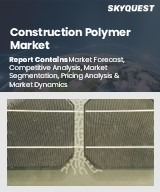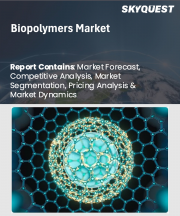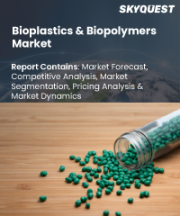
|
시장보고서
상품코드
1832358
바이오 건설용 폴리머 시장 : 폴리머 유형, 최종 용도, 유통 채널, 폼 유형, 지속가능성 인증별 - 세계 예측(2025-2032년)Bio-based Construction Polymers Market by Polymer Type, Application, End Use, Distribution Channel, Form Type, Sustainability Certification - Global Forecast 2025-2032 |
||||||
바이오 건설용 폴리머 시장은 2032년까지 연평균 복합 성장률(CAGR) 10.42%로 321억 5,000만 달러에 이를 것으로 예측됩니다.
| 주요 시장 통계 | |
|---|---|
| 기준 연도 : 2024년 | 145억 4,000만 달러 |
| 추정 연도 : 2025년 | 160억 3,000만 달러 |
| 예측 연도 : 2032년 | 321억 5,000만 달러 |
| CAGR(%) | 10.42% |
바이오 건축용 폴리머를 환경 문제 대응, 기술 발전, 건축 환경 프로젝트에서 사양 주도형 채용의 교차로에 배치
소개에서는 바이오 건축용 폴리머를 환경적 요구와 기술적 진보가 결합하여 건축 관행을 재구성하는 빠르게 진화하는 재료 상황 속에서 바이오 건축용 폴리머를 위치시키고 있습니다. 최근 건축가, 설계자, 재료 기술자들 사이에서 폴리머의 라이프사이클에 대한 관심이 높아지면서 재생 가능한 바이오매스, 재활용 원료, 생명공학을 활용한 새로운 원료에 대한 관심이 높아지고 있습니다. 동시에 폴리머의 성능, 특히 내구성, 내화성 및 가공 적합성이 향상되어 구조용 복합재, 단열재, 보호 도료와 같은 까다로운 응용 분야에서 대체 장벽이 낮아졌습니다.
그 결과, 업계 이해관계자들은 현재 바이오 배합을 단순히 지속 가능한 대안이 아닌, 구체화된 탄소를 줄이고 순환형 목표를 지원하는 새로운 디자인 패러다임의 실현자로 평가했습니다. 이러한 변화는 인증 프레임워크와 입증 가능한 환경적 자격 증명을 보상하는 조달 정책의 병행 개발로 뒷받침되고 있습니다. 그 결과, 제조업체와 재료 공급업체들은 바이오 솔루션이 건설 최종 용도의 엄격한 기능적 요구 사항과 규제 요건을 충족할 수 있도록 폴리머 화학, 공정 엔지니어링, 용도별 테스트를 결합한 종합적인 연구개발을 우선순위에 두고 있습니다. 앞으로는 기술적 검증, 공급망의 견고성, 규제와의 정합성의 상호 작용이 시장 수용의 속도와 규모를 좌우할 것입니다.
진화하는 규제 압력, 원료의 다양화, 고분자 기술 혁신의 수렴, 건설 분야에서 바이오 재료의 채택 경로를 어떻게 변화시킬 것인가?
바이오 폴리머를 둘러싼 환경은 지속가능성 의무화, 공급망 역학 변화, 급속한 소재 혁신 등 다양한 요인으로 인해 크게 변화하고 있습니다. 규제 당국의 압력과 고객의 조달 선호도에 따라 건설 밸류체인은 저탄소 함량과 추적 가능성을 우선시하고 있으며, 사양 개발자는 신뢰할 수 있는 인증과 검증 가능한 공급망을 요구하고 있습니다. 한편, 농업잔재물에서 인공미생물 중간체까지 원료의 다양화는 새로운 배합의 가능성을 열어주는 동시에 기존 물류 및 가공 인프라에 과제를 던지고 있습니다.
중합, 용해, 첨가제 화학의 기술적 혁신으로 기계적 성능과 가공 창구가 개선되어 바이오 수지가 기존 석유화학 수지와 보다 직접적으로 경쟁할 수 있게 되었습니다. 또한, 재료 특성화 및 수명주기 평가를 위한 디지털 도구는 투명성을 높이고 반복적인 제품 개발을 가속화하고 있습니다. 이러한 변화를 종합하면, 재료 공급업체, 계약업체, 인증기관이 주류 채택을 위한 경로를 공동으로 설계하는 등 부문 간 협력이 촉진되고 있습니다. 가까운 미래에 가장 중요한 변화는 생산자가 비용 효율적인 원료 공급을 확대하고, 기술 사양을 표준화하고, 실제 건설 조건에서 장기 내구성을 입증할 수 있는 능력에 따라 달라질 것입니다.
2025년 관세 조치가 바이오 폴리머 제조업체의 원료 조달, 공급 탄력성, 현지화 전략에 미치는 전략적 파급효과 평가
2025년 새로운 관세 및 무역 조치의 도입으로 바이오 건축용 폴리머공급망이 복잡해져 원료 조달, 중간 수입, 완제품 이동에 직접적인 영향을 미치고 있습니다. 관세 조정으로 인해 국내에서 대규모로 생산되지 않는 특정 원료 및 폴리머 중간체의 육지 비용이 상승함에 따라 일부 제조업체는 공급업체와의 관계 및 재고 전략을 재검토해야 할 필요가 있습니다. 이에 따라 조달팀은 비용 변동과 리드타임의 불확실성으로부터 프로젝트를 보호하기 위해 국내 공급업체와 지역 파트너의 자격 인증을 가속화하고 있습니다.
직접적인 비용 효과 외에도 관세는 수직적 통합과 현지 생산을 장려함으로써 경쟁 역학을 변화시켰습니다. 일부 기업들은 업스트림 원료 계약을 확보하고 최종 시장에 가까운 다운스트림 화합물 생산 능력에 투자하는 이니셔티브를 발표했습니다. 이러한 방향 전환은 회복력을 뒷받침하지만, 동시에 설비 투자와 전략적 재편이 필요합니다. 또한, 이번 관세 인상으로 인해 정책 참여에 대한 관심이 높아지고 있으며, 업계 관계자들은 환경적으로 유리한 원료에 대한 페널티를 피하기 위해 조화로운 기준과 인증된 지속 가능한 원료에 대한 무역 제외를 옹호하고 있습니다. 따라서 의사결정자들은 단기적인 조달 조정과 장기적인 공급망 재설계를 균형 있게 조정하고, 바이오 가치 제안의 핵심인 탄력성과 지속가능성을 입증하는 데 우선순위를 두어야 합니다.
상세한 세분화 분석을 통해 폴리머의 화학적 특성, 최종 용도, 유통 모델, 폼 팩터 및 인증 경로가 어떻게 전략적 선택을 형성하는지 파악할 수 있습니다.
폴리머의 유형, 용도, 최종 용도, 유통 경로, 폼 팩터, 인증 획득 경로 등 기술적, 상업적, 지속가능성 우선순위가 어떻게 교차하는지를 미묘한 세분화 렌즈를 통해 보여줍니다. 폴리에스테르의 유형에는 폴리부틸렌 테레프탈레이트와 폴리에틸렌 테레프탈레이트가 있으며, 폴리에틸렌은 고밀도 등급과 저밀도 등급으로 나뉘며, 폴리우레탄의 배합은 최종 용도에 따라 코팅, 연질 폼, 경질 폼으로 나뉩니다. 이러한 재료의 차이는 인장 강도, 열 안정성, 내습성 등 특정 성능 기준에 따라 설계자와 시공자가 수지를 선택하는 방식에 영향을 미칩니다.
코팅과 접착제, 복합재료, 필름 및 시트, 단열재와 같은 용도 분류는 건축 부재에서 폴리머의 기능적 역할을 나타내며, 코팅과 접착제는 접착제 시스템, 코팅의 화학적 특성, 실란트 및 엘라스토머의 배합에 따라 더욱 구분됩니다. 복합재료에는 구조성능과 제조성에 영향을 미치는 섬유강화, 적층, 입자강화 시스템이 포함되며, 필름 및 시트는 배리어 필름과 구조용 시트로 나뉩니다. 단열재는 보드 스톡, 루스필, 스프레이 폼의 각 형태를 구분하고 각각에 맞는 열, 음향, 방화 성능이 요구됩니다. 의료, 사무실, 소매와 같은 상업용 서브마켓에서는 특정 위생, 내하중, 미적 기준이 부과되며, 인프라에서는 교량, 도로, 터널 등에서 긴 수명과 환경적 스트레스에 대한 내성이 요구됩니다. 주택용도는 신축과 개축의 차이를 반영하여 사양 주기 및 개보수 적합성에 영향을 미칩니다.
유통 경로에는 직접 판매, 대리점, 전자상거래 채널이 있으며, 이들은 고객 접근, 기술 지원 및 이행 역학을 형성합니다. 과립, 액체, 분말과 같은 형상 요인은 압출 성형에서 현장 타정 시스템까지의 가공 경로를 결정하고 설비 투자 및 현장 취급에 영향을 미칩니다. 마지막으로, 지속가능성 인증은 제품을 인증된 지속가능한 흐름과 비인증된 지속가능한 흐름으로 구분하고, ISCC나 USDA Biopreferred와 같은 인증 제도는 추적성과 클레임 입증을 제공합니다. 이러한 세분화는 제품 개발 우선순위, 시장 개척 전략, 프로젝트별 수요에 맞는 서비스 및 기술 지원 모델 설계의 지침이 됩니다.
지역마다 다른 정책 프레임워크, 원료의 가용성, 건설 수요의 사이클이 바이오 폴리머 솔루션의 명확한 채택 경로를 형성하고 있습니다.
바이오 건축용 폴리머가 세계 시장에서 개발, 전개 및 규제되는 방식은 지역 역학에 의해 크게 영향을 받습니다. 북미와 남미에서는 지자체 지속가능성 정책, 녹색건축 인증, 주거 및 상업 부문의 활발한 리노베이션 사이클 등 수요 측면의 모멘텀이 강하고, 공급업체는 현지 원료 제휴 및 가공 능력의 확장을 우선시하고 있습니다. 반면 유럽, 중동, 아프리카는 엄격한 규제 프레임워크, 선진적인 순환형 사회로의 전환, 지역별로 다른 원료 재배 및 가공 능력 등이 복잡하게 얽혀 있습니다.
아시아태평양은 급속한 도시화, 대규모 인프라 개발 계획, 기존 폴리머와 바이오 폴리머 생산 능력에 대한 대규모 투자로 인해 높은 채용 잠재력이 지속되고 있습니다. 그러나 규제 상황과 원료의 가용성은 지역마다 다르기 때문에 성공적인 시장 진입을 위해서는 합작 투자나 현지 규제 요건과 기후적 기대 성능을 충족시키기 위한 현지화 된 배합에 의존하는 경우가 많습니다. 어느 지역이든, 국경 간 물류, 인증의 인지도, 지역 정책적 인센티브가 바이오 솔루션이 건설 관행의 주류에 침투하는 속도를 좌우할 것입니다. 따라서 다국적 공급업체는 제품 사양, 기술 문서, 상업 모델을 각 지역의 조달 선호도 및 규제 체계에 맞게 조정해야 합니다.
규모, 전문화, 전략적 파트너십, 인증에 따른 차별화에 따라 생산자와 소재 개발 기업간 경쟁 역학이 형성됨.
바이오 건축용 고분자 생태계의 경쟁 역학은 기존 고분자 제조 기업, 혁신적인 특수 소재 기업, 원료에서 제품까지 밸류체인을 추구하는 수직 통합형 개발 기업의 융합으로 정의됩니다. 기존 대기업들은 규모와 유통망을 활용하여 기존 제품 라인에 바이오 변형을 도입하는 반면, 중소 전문 기업들은 틈새 시장에서의 성능 우위나 프리미엄 사양으로 만들 수 있는 독특한 원료 원산지에 초점을 맞추었습니다. 자재 제조업체, 컴파운드 제조업체, 건설 제품 제조업체 간의 공동 개발 계약은 건축가 및 시공사에 대한 검증을 가속화하고 사양 결정까지의 시간을 단축하기 위해 관계자들 사이에서 일반화되어 있습니다.
투자 활동은 바이오프로세스 및 화합물 생산 능력 확대, 출처 및 수명주기 평가를 위한 분석 능력 강화, 사양 도입을 지원하는 기술 서비스 확대에 집중하고 있습니다. 동시에 인증 기관과 표준화 단체는 공급업체를 차별화하는 데 영향력있는 역할을하고 있으며, 인증 된 지속 가능한 자격은 대규모 기관 투자자 시장 진입 요건으로 점점 더 많이 작용하고 있습니다. 전반적으로, 견고한 기술 검증, 탄력적인 원자재 조달 및 교육, 현장 지원, 건설 이해관계자의 채용 마찰을 줄이는 보증 프레임워크를 포함한 반응성 높은 상업 모델을 결합한 조직은 경쟁 우위를 확보할 수 있습니다.
원료의 탄력성을 보장하고, 기술 검증을 가속화하고, 사양 중심의 바이오 재료에 대한 수요를 자극하기 위해 업계 리더가 채택해야 할 실질적인 전략적 움직임
업계 리더는 바이오 폴리머의 잠재력을 전체 건축 환경의 내구성 있는 상업적 성과로 연결하기 위해 종합적인 일련의 행동을 추구해야 합니다. 첫째, 공급망 다변화를 우선시하고 여러 원료 공급원과 유연한 생산 능력을 확보하여 무역 혼란과 관세로 인한 비용 상승 압력을 완화합니다. 또한, 리드 타임을 단축하고 현지 사양 요구사항에 대한 대응력을 향상시키기 위해 다운스트림 컴파운드 설비 및 지역 마감 설비에 대한 전략적 투자로 이를 보완합니다. 둘째, 제3자 기관의 내구성 시험, 방화-방연 성능 평가, 장기 내후성 조사 등을 통해 기술적 검증을 강화하여 사양 수립자 및 규제 당국의 신뢰를 높입니다.
셋째, 조달 의무와 기관 구매자의 기대에 부응하기 위해 인증 프레임워크 및 투명한 CoC 보고서와 상업적 제공물을 일치시켜야 합니다. 넷째, 시공업체, 건축가, 단열재 및 복합재 제조업체와 분야를 초월한 파트너십을 구축하여 시공 프로토콜과 보증으로 뒷받침되는 성능 보증을 공동 개발합니다. 마지막으로, 사양 가이드, 교육 프로그램, 재료 특성을 시공 가능한 솔루션으로 변환하는 디지털 도구 등 타겟팅된 상용화 활동에 투자합니다. 이러한 다각적인 접근 방식을 통해 리더는 구매자의 채용 위험을 줄이고, 프로젝트 사양에 대한 통합을 가속화하며, 신흥 바이오 소재 시장에서 방어 범위를 넓힐 수 있습니다.
관계자 인터뷰, 기술 검토, 인증 분석, 반복 검증을 결합한 엄격한 다면 조사 접근 방식을 통해 실용적이고 실행 가능한 통찰력을 보장합니다.
본 조사방법을 뒷받침하는 조사방법은 정성적 방법과 정량적 방법이 통합되어 있어 견고성과 실용적 타당성이 확보되어 있습니다. 고분자 과학자, 제품 관리자, 조달 책임자 및 사양 담당자와의 1차 면담을 통해 성능 요구사항, 공급망 현실 및 채택 장벽에 대한 생생한 관점을 제공했습니다. 이러한 인터뷰는 기술 문헌 검토, 표준 및 인증 분석, 규제 압력과 인센티브 구조의 맥락을 보여주는 공공 정책 문서의 통합을 통해 보완되었습니다. 연구소의 시험 보고서와 재료 데이터 시트는 바이오 배합의 기계적, 열적, 노화 특성을 비교 평가하는 데 도움이 되었습니다.
2차 자료로는 업계 백서, 회의록, 기술 표준 등을 활용하여 통찰력의 삼각관계를 구축하고 새로운 동향을 검증했습니다. 조사 방법으로는 인증 프로세스와 CoC의 메커니즘을 검토하여 지속가능성 주장의 추적가능성에 중점을 두었습니다. 또한, 상업, 기술, 조달 각 분야에서 실용적인 결론을 도출하기 위해 이해관계자 워크숍과 동료 검토를 반복하여 얻은 결과를 상호 검증하는 과정을 거쳤습니다. 독자적인 데이터 접근 및 원료 보고의 지역적 차이와 관련된 한계는 시나리오 분석과 민감도 검사를 통해 해결하여 균형 잡힌 증거에 기반한 관점을 제시했습니다.
기술적 검증, 공급망 강인성, 전략적 상업화가 바이오 폴리머 솔루션의 주류화를 결정짓는다는 조사 결과 통합
결론적으로, 바이오 건축용 폴리머는 틈새 시장인 지속가능성 실험에서 건축 환경의 성능, 규제, 수명주기 문제를 해결할 수 있는 신뢰할 수 있는 대안으로 전환하고 있습니다. 폴리머 기술의 발전, 인증 프레임워크의 확대, 조달에 대한 기대치의 변화라는 세 가지 요인이 겹치면서 기술적 동등성과 검증 가능한 지속가능성을 증명할 수 있는 공급업체에게 기회가 주어지고 있습니다. 그러나 주류 채택으로 가는 길은 업계가 어떻게 공급망 탄력성을 관리하고, 관세 주도 시장 신호에 대응하고, 설계자와 시공업체에 종합적인 기술 지원을 제공할 수 있는지에 달려 있습니다.
이러한 추세를 활용하기 위해 이해관계자들은 조달 및 물류 최적화와 같은 단기적인 업무 조정과 제품 검증, 지역 생산 능력, 채용 마찰을 줄이는 파트너십 모델에 대한 장기적인 투자 사이에서 균형을 맞추어야 합니다. 바이오 폴리머는 기술, 정책 참여 및 상업적 실행을 신중하게 조정하여 건설에서 환경 발자국을 줄이는 데 중요한 역할을 할 수 있으며, 동시에 현대 인프라 및 건축물에 요구되는 까다로운 성능을 충족시킬 수 있습니다.
목차
제1장 서문
제2장 조사 방법
제3장 주요 요약
제4장 시장 개요
제5장 시장 인사이트
제6장 미국 관세의 누적 영향 2025
제7장 AI의 누적 영향 2025
제8장 바이오 건설용 폴리머 시장 폴리머 유형별
- 폴리에스테르
- Pbt
- PET
- 폴리에틸렌
- 고밀도
- 저밀도
- 폴리프로필렌
- 폴리우레탄
- 코팅
- 연질폼
- 경질폼
제9장 바이오 건설용 폴리머 시장 : 용도별
- 코팅제 및 접착제
- 접착제
- 코팅
- 실란트 및 엘라스토머
- 복합재료
- 섬유 강화
- 라미네이트
- 입자 강화
- 필름 및 시트
- 배리어 필름
- 구조 시트
- 절연
- Boardstock
- Loose Fill
- Spray Foam
제10장 바이오 건설용 폴리머 시장 : 최종 용도별
- 상업
- 헬스케어
- 오피스
- 소매
- 인프라
- 다리
- 도로
- 터널
- 주택
- 신축
- 개보수
제11장 바이오 건설용 폴리머 시장 : 유통 채널별
- 직접 판매
- 유통업체
- E-Commerce
제12장 바이오 건설용 폴리머 시장 폼 유형별
- 과립
- 액체
- 분말
제13장 바이오 건설용 폴리머 시장 지속가능성 인증
- 지속가능한 인증
- Iscc
- Usda Biopreferred
- 비인증
제14장 바이오 건설용 폴리머 시장 : 지역별
- 아메리카
- 북미
- 라틴아메리카
- 유럽, 중동 및 아프리카
- 유럽
- 중동
- 아프리카
- 아시아태평양
제15장 바이오 건설용 폴리머 시장 : 그룹별
- ASEAN
- GCC
- EU
- BRICS
- G7
- NATO
제16장 바이오 건설용 폴리머 시장 : 국가별
- 미국
- 캐나다
- 멕시코
- 브라질
- 영국
- 독일
- 프랑스
- 러시아
- 이탈리아
- 스페인
- 중국
- 인도
- 일본
- 호주
- 한국
제17장 경쟁 구도
- 시장 점유율 분석, 2024
- FPNV 포지셔닝 매트릭스, 2024
- 경쟁 분석
- BASF SE
- Dow Inc.
- Covestro AG
- DuPont de Nemours, Inc.
- Arkema S.A.
- Tate & Lyle PLC
- Eastman Chemical Company
- Ashland Global Holdings, Inc.
- Wacker Chemie AG
- Huntsman Corporation
The Bio-based Construction Polymers Market is projected to grow by USD 32.15 billion at a CAGR of 10.42% by 2032.
| KEY MARKET STATISTICS | |
|---|---|
| Base Year [2024] | USD 14.54 billion |
| Estimated Year [2025] | USD 16.03 billion |
| Forecast Year [2032] | USD 32.15 billion |
| CAGR (%) | 10.42% |
Positioning bio-based construction polymers at the intersection of environmental imperatives, technological advances, and specification-driven adoption in built-environment projects
The introduction situates bio-based construction polymers within a rapidly evolving materials landscape where environmental imperatives and technological advances converge to reshape building practices. Over recent years, architects, specifiers, and materials engineers have increased their scrutiny of polymer lifecycles, driving interest in feedstocks derived from renewable biomass, recycled streams, and novel biotechnological routes. At the same time, improvements in polymer performance-particularly in durability, fire resistance, and processing compatibility-have reduced barriers to substitution in demanding applications such as structural composites, insulation, and protective coatings.
Consequently, industry stakeholders are now evaluating bio-based formulations not simply as sustainable alternatives but as enablers of new design paradigms that can reduce embodied carbon and support circularity objectives. This shift has been supported by parallel developments in certification frameworks and procurement policies that reward demonstrable environmental credentials. As a result, manufacturers and materials suppliers are prioritizing integrated R&D that combines polymer chemistry, process engineering, and application-specific testing to ensure that bio-based solutions meet the rigorous functional and regulatory requirements of construction end uses. Moving forward, the interaction between technical validation, supply chain resilience, and regulatory alignment will determine the speed and scale of market acceptance.
How evolving regulatory pressures, feedstock diversification, and polymer innovation are converging to transform adoption pathways for bio-based materials in construction
Transformative shifts across the bio-based polymer landscape have emerged from converging drivers that include stricter sustainability mandates, shifting supply chain dynamics, and rapid materials innovation. Regulatory pressure and client procurement preferences have nudged construction value chains to prioritize low-carbon content and traceability, prompting specifiers to demand reliable certification and verifiable supply streams. Meanwhile, feedstock diversification-from agricultural residues to engineered microbial intermediates-has opened new formulation possibilities while also challenging incumbent logistics and processing infrastructures.
Technological breakthroughs in polymerization, compatibilization, and additive chemistries have improved mechanical performance and processing windows, enabling bio-based resins to compete more directly with conventional petrochemical counterparts. Furthermore, digital tools for materials characterization and lifecycle assessment are enhancing transparency and accelerating iterative product development. Taken together, these shifts are catalyzing cross-sector collaboration, where material suppliers, contractors, and certification bodies co-design pathways to mainstream adoption. In the near term, the most significant changes will be driven by the ability of producers to scale cost-effective feedstock supply, standardize technical specifications, and demonstrate long-term durability under real-world construction conditions.
Assessing the strategic ripple effects of 2025 tariff measures on raw material sourcing, supply resilience, and localization strategies for bio-based polymer manufacturers
The introduction of new tariffs and trade measures in 2025 has compounded existing supply chain complexities for bio-based construction polymers, with immediate implications for raw material sourcing, intermediate imports, and finished product movement. Tariff adjustments have raised landed costs for certain feedstocks and polymer intermediates that are not domestically produced at scale, prompting some manufacturers to reassess supplier relationships and inventory strategies. In response, procurement teams have accelerated qualification of domestic suppliers and regional partners to shield projects from cost volatility and lead-time uncertainty.
In addition to direct cost effects, tariffs have altered competitive dynamics by incentivizing vertical integration and localized manufacturing. Several firms have announced initiatives to secure upstream feedstock contracts and to invest in downstream compounding capacity closer to end markets. This reorientation supports resilience but also requires capital investment and strategic realignment. Moreover, the tariffs have intensified attention on policy engagement, with industry participants advocating for harmonized standards and trade carve-outs for certified sustainable feedstocks to avoid penalizing environmentally preferred materials. As a result, decision-makers must balance short-term procurement adjustments with long-term supply chain redesigns that prioritize both resilience and the sustainability credentials central to bio-based value propositions.
Deep segmentation analysis revealing how polymer chemistries, application families, end-use requirements, distribution models, form factors, and certification pathways shape strategic choices
A nuanced segmentation lens reveals where technical, commercial, and sustainability priorities intersect across polymer types, applications, end uses, channels, form factors, and certification pathways. Polymer portfolios span polyester, polyethylene, polypropylene, and polyurethane families, each presenting distinct performance characteristics and formulation challenges; polyester variants include polybutylene terephthalate and polyethylene terephthalate, polyethylene divides into high-density and low-density grades, and polyurethane formulations vary by end-use between coatings, flexible foam, and rigid foam. These material distinctions influence how designers and applicators select resins for specific performance criteria such as tensile strength, thermal stability, and moisture resistance.
Application categories-coatings and adhesives, composites, films and sheets, and insulation-capture the functional roles polymers play within construction assemblies, with coatings and adhesives further differentiated by adhesive systems, coating chemistries, and sealant or elastomer formulations. Composites include fiber-reinforced, laminated, and particle-reinforced systems that affect structural performance and manufacturability, while films and sheets separate barrier films from structural sheet applications. Insulation distinguishes boardstock, loose fill, and spray foam formats, each requiring tailored thermal, acoustic, and fire performance. End-use segmentation separates commercial, infrastructure, and residential projects, with commercial submarkets such as healthcare, office, and retail imposing specific hygiene, load-bearing, and aesthetic standards, while infrastructure demands longevity and resistance to environmental stressors across bridges, roadways, and tunnels. Residential applications reflect differences between new construction and renovation, affecting specification cycles and retrofit compatibility.
Distribution pathways include direct sales, distributors, and e-commerce channels, which shape customer access, technical support, and fulfillment dynamics. Form factors-granules, liquids, and powders-determine processing routes from extrusion to cast-in-place systems, influencing equipment investments and onsite handling. Finally, sustainability certification divides offerings into certified sustainable and non-certified streams, with certification schemes such as ISCC and USDA Biopreferred providing traceability and claims substantiation. Together, these segmentation dimensions guide product development priorities, route-to-market strategies, and the design of service and technical support models to meet project-specific demands.
How divergent regional policy frameworks, feedstock availability, and construction demand cycles are shaping distinct adoption pathways for bio-based polymer solutions
Regional dynamics exert a strong influence on how bio-based construction polymers are developed, deployed, and regulated across global markets. The Americas exhibit strong demand-side momentum from municipal sustainability policies, green building certifications, and active renovation cycles in both residential and commercial sectors, prompting suppliers to prioritize local feedstock partnerships and scaled processing capabilities. In contrast, Europe, Middle East & Africa shows a complex interplay between stringent regulatory frameworks, advanced circularity initiatives, and varying regional capacity for feedstock cultivation and processing; this diversity requires flexible product portfolios and region-specific compliance strategies.
Asia-Pacific continues to demonstrate high adoption potential driven by rapid urbanization, large-scale infrastructure programs, and significant investments in manufacturing capacity for both traditional and bio-based polymers. However, heterogeneous regulatory landscapes and feedstock availability across the region mean that successful market entries often rely on joint ventures and localized formulation to meet local code requirements and climatic performance expectations. Across all regions, cross-border logistics, certification recognition, and regional policy incentives will determine the pace at which bio-based solutions penetrate mainstream construction practices. Accordingly, multinational suppliers must calibrate product specifications, technical documentation, and commercial models to match regional procurement preferences and regulatory regimes.
Competitive dynamics shaped by scale, specialization, strategic partnerships, and certification-driven differentiation among producers and materials developers
Competitive dynamics in the bio-based construction polymer ecosystem are defined by a blend of established polymer producers, innovative specialty materials firms, and vertically integrated developers pursuing feedstock-to-product value chains. Major incumbents leverage scale and distribution networks to introduce bio-based variants into existing product lines, while smaller specialists focus on niche performance advantages or unique feedstock origins that can command premium specifications. Collaboration and co-development agreements between material producers, compounders, and construction product manufacturers have become common as parties seek to accelerate validation and reduce time-to-specification for architects and contractors.
Investment activity has concentrated on scaling up bioprocessing and compounding capacity, enhancing analytical capabilities for provenance and lifecycle assessment, and expanding technical service offerings to support specification uptake. At the same time, certification bodies and standards organizations play an influential role in differentiating suppliers, with certified sustainable credentials increasingly acting as a market entry requirement for large institutional buyers. Overall, competitive advantage accrues to organizations that combine robust technical validation, resilient feedstock sourcing, and responsive commercial models that include training, on-site support, and warranty frameworks that reduce adoption friction for construction stakeholders.
Practical strategic moves industry leaders must adopt to secure feedstock resilience, accelerate technical validation, and unlock specification-driven demand for bio-based materials
Industry leaders should pursue a holistic set of actions to translate the promise of bio-based polymers into durable commercial outcomes across the built environment. First, prioritize supply chain diversification by locking in multiple feedstock sources and flexible production capacity to mitigate trade disruptions and tariff-driven cost pressures. Complement this with strategic investments in downstream compounding and regional finishing facilities to reduce lead times and improve responsiveness to local specification requirements. Second, strengthen technical validation through third-party durability testing, fire and smoke performance assessments, and long-term weathering studies to build confidence among specifiers and regulators.
Third, align commercial offerings with certification frameworks and transparent chain-of-custody reporting to meet procurement mandates and institutional buyer expectations. Fourth, cultivate cross-sector partnerships with contractors, architects, and insulation or composite fabricators to co-develop installation protocols and warranty-backed performance assurances. Finally, invest in targeted commercialization activities such as specification guides, training programs, and digital tools that translate material properties into constructible solutions. By executing this multifaceted approach, leaders can reduce adoption risk for buyers, accelerate inclusion in project specifications, and create defensible positions in the emerging bio-based materials market.
A rigorous multi-method research approach combining stakeholder interviews, technical review, certification analysis, and iterative validation to ensure practical and actionable insights
The research methodology underpinning this study integrates qualitative and quantitative techniques to ensure robustness and practical relevance. Primary engagements with polymer scientists, product managers, procurement leaders, and specification authorities provided first-hand perspectives on performance requirements, supply chain realities, and adoption barriers. These interviews were complemented by technical literature reviews, standards and certification analyses, and synthesis of public policy documents that contextualize regulatory pressures and incentive structures. Laboratory test reports and materials data sheets informed comparative assessments of mechanical, thermal, and aging properties across bio-based formulations.
Secondary sources included industry white papers, conference proceedings, and technical standards to triangulate insights and validate emerging trends. The methodology emphasized traceability of sustainability claims by reviewing certification processes and chain-of-custody mechanisms. Throughout, findings were cross-validated through stakeholder workshops and iterative peer review to ensure conclusions are actionable for commercial, technical, and procurement audiences. Any limitations related to proprietary data access or regional variability in feedstock reporting were addressed through scenario analysis and sensitivity checks to present a balanced, evidence-based perspective.
Synthesis of findings showing how technical validation, supply chain resilience, and strategic commercialization will determine the mainstreaming of bio-based polymer solutions
In conclusion, bio-based construction polymers are transitioning from niche sustainability experiments toward credible alternatives that address performance, regulatory, and lifecycle concerns within the built environment. The convergence of improved polymer technologies, expanding certification frameworks, and shifting procurement expectations has created a window of opportunity for suppliers who can demonstrate both technical equivalence and verifiable sustainability credentials. Yet the path to mainstream adoption will depend on how well the industry manages supply chain resilience, responds to tariff-driven market signals, and delivers comprehensive technical support to specifiers and installers.
To capitalize on these trends, stakeholders must balance near-term operational adjustments-such as sourcing and logistics optimization-with longer-term investments in product validation, regional production capacity, and partnership models that reduce adoption friction. With careful alignment of technology, policy engagement, and commercial execution, bio-based polymers can play a meaningful role in lowering the environmental footprint of construction while meeting the demanding performance expectations of modern infrastructure and buildings.
Table of Contents
1. Preface
- 1.1. Objectives of the Study
- 1.2. Market Segmentation & Coverage
- 1.3. Years Considered for the Study
- 1.4. Currency & Pricing
- 1.5. Language
- 1.6. Stakeholders
2. Research Methodology
3. Executive Summary
4. Market Overview
5. Market Insights
- 5.1. Advances in polylactic acid composites improving structural insulation performance
- 5.2. Development of cellulose nanofiber reinforced bio-polyamide 3D printed building components
- 5.3. Emerging mycelium-based biopolymer wall panels offering biodegradability and sound insulation benefits
- 5.4. Innovations in bio-based polyurethane foams with enhanced fire retardancy for thermal insulation applications
- 5.5. Integration of algae-derived polymers in roofing membranes to reduce carbon footprint and improve durability
- 5.6. Collaborative partnerships between biopolymer suppliers and construction firms to scale low-VOC materials
- 5.7. Government incentive programs accelerating adoption of bio-based binders in concrete and mortar mixes
6. Cumulative Impact of United States Tariffs 2025
7. Cumulative Impact of Artificial Intelligence 2025
8. Bio-based Construction Polymers Market, by Polymer Type
- 8.1. Polyester
- 8.1.1. Pbt
- 8.1.2. Pet
- 8.2. Polyethylene
- 8.2.1. High Density
- 8.2.2. Low Density
- 8.3. Polypropylene
- 8.4. Polyurethane
- 8.4.1. Coatings
- 8.4.2. Flexible Foam
- 8.4.3. Rigid Foam
9. Bio-based Construction Polymers Market, by Application
- 9.1. Coatings & Adhesives
- 9.1.1. Adhesives
- 9.1.2. Coatings
- 9.1.3. Sealants & Elastomers
- 9.2. Composites
- 9.2.1. Fiber Reinforced
- 9.2.2. Laminates
- 9.2.3. Particle Reinforced
- 9.3. Films & Sheets
- 9.3.1. Barrier Films
- 9.3.2. Structural Sheets
- 9.4. Insulation
- 9.4.1. Boardstock
- 9.4.2. Loose Fill
- 9.4.3. Spray Foam
10. Bio-based Construction Polymers Market, by End Use
- 10.1. Commercial
- 10.1.1. Healthcare
- 10.1.2. Office
- 10.1.3. Retail
- 10.2. Infrastructure
- 10.2.1. Bridges
- 10.2.2. Roadways
- 10.2.3. Tunnels
- 10.3. Residential
- 10.3.1. New Construction
- 10.3.2. Renovation
11. Bio-based Construction Polymers Market, by Distribution Channel
- 11.1. Direct Sales
- 11.2. Distributors
- 11.3. E-commerce
12. Bio-based Construction Polymers Market, by Form Type
- 12.1. Granules
- 12.2. Liquids
- 12.3. Powders
13. Bio-based Construction Polymers Market, by Sustainability Certification
- 13.1. Certified Sustainable
- 13.1.1. Iscc
- 13.1.2. Usda Biopreferred
- 13.2. Non-certified
14. Bio-based Construction Polymers Market, by Region
- 14.1. Americas
- 14.1.1. North America
- 14.1.2. Latin America
- 14.2. Europe, Middle East & Africa
- 14.2.1. Europe
- 14.2.2. Middle East
- 14.2.3. Africa
- 14.3. Asia-Pacific
15. Bio-based Construction Polymers Market, by Group
- 15.1. ASEAN
- 15.2. GCC
- 15.3. European Union
- 15.4. BRICS
- 15.5. G7
- 15.6. NATO
16. Bio-based Construction Polymers Market, by Country
- 16.1. United States
- 16.2. Canada
- 16.3. Mexico
- 16.4. Brazil
- 16.5. United Kingdom
- 16.6. Germany
- 16.7. France
- 16.8. Russia
- 16.9. Italy
- 16.10. Spain
- 16.11. China
- 16.12. India
- 16.13. Japan
- 16.14. Australia
- 16.15. South Korea
17. Competitive Landscape
- 17.1. Market Share Analysis, 2024
- 17.2. FPNV Positioning Matrix, 2024
- 17.3. Competitive Analysis
- 17.3.1. BASF SE
- 17.3.2. Dow Inc.
- 17.3.3. Covestro AG
- 17.3.4. DuPont de Nemours, Inc.
- 17.3.5. Arkema S.A.
- 17.3.6. Tate & Lyle PLC
- 17.3.7. Eastman Chemical Company
- 17.3.8. Ashland Global Holdings, Inc.
- 17.3.9. Wacker Chemie AG
- 17.3.10. Huntsman Corporation



















